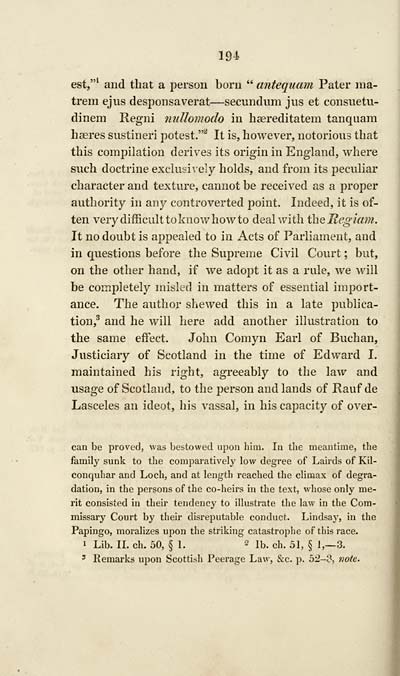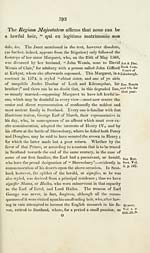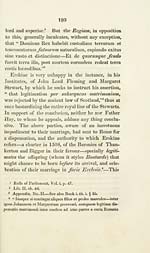Tracts, legal and historical
(210) Page 194
Download files
Complete book:
Individual page:
Thumbnail gallery: Grid view | List view

194
est," and that a person born " antequam Pater ma-
trem ejus desponsaverat — secundum jus et consuetu-
dinem Regni nullomodo in haereditatem tanquam
hseres sustineri potest." 2 It is, however, notorious that
this compilation derives its origin in England, where
such doctrine exclusively holds, and from its peculiar
character and texture, cannot be received as a proper
authority in any controverted point. Indeed, it is of-
ten very difficult to know how to deal with the Hegiam.
It no doubt is appealed to in Acts of Parliament, and
in questions before the Supreme Civil Court ; but,
on the other hand, if we adopt it as a rule, we will
be completely misled in matters of essential import-
ance. The author shewed this in a late publica-
tion, 3 and he will here add another illustration to
the same effect. John Comyn Earl of Buchan,
Justiciary of Scotland in the time of Edward I.
maintained his right, agreeably to the law and
usage of Scotland, to the person and lands of Rauf de
Lasceles an ideot, his vassal, in his capacity of over-
can be proved, was bestowed upon him. In the meantime, the
family sunk to the comparatively low degree of Lairds of Kil-
conquhar and Loch, and at length reached the climax of degra-
dation, in the persons of the co-heirs in the text, whose only me-
rit consisted in their tendency to illustrate the law in the Com-
missary Court by their disreputable conduct. Lindsay, in the
Papingo, moralizes upon the striking catastrophe of this race.
i Lib. II. ch. 50, § 1. 2 lb. ch. 51, § 1,-3.
3 Remarks upon Scottish Peerage Law, Sec. p. 52-3, note.
est," and that a person born " antequam Pater ma-
trem ejus desponsaverat — secundum jus et consuetu-
dinem Regni nullomodo in haereditatem tanquam
hseres sustineri potest." 2 It is, however, notorious that
this compilation derives its origin in England, where
such doctrine exclusively holds, and from its peculiar
character and texture, cannot be received as a proper
authority in any controverted point. Indeed, it is of-
ten very difficult to know how to deal with the Hegiam.
It no doubt is appealed to in Acts of Parliament, and
in questions before the Supreme Civil Court ; but,
on the other hand, if we adopt it as a rule, we will
be completely misled in matters of essential import-
ance. The author shewed this in a late publica-
tion, 3 and he will here add another illustration to
the same effect. John Comyn Earl of Buchan,
Justiciary of Scotland in the time of Edward I.
maintained his right, agreeably to the law and
usage of Scotland, to the person and lands of Rauf de
Lasceles an ideot, his vassal, in his capacity of over-
can be proved, was bestowed upon him. In the meantime, the
family sunk to the comparatively low degree of Lairds of Kil-
conquhar and Loch, and at length reached the climax of degra-
dation, in the persons of the co-heirs in the text, whose only me-
rit consisted in their tendency to illustrate the law in the Com-
missary Court by their disreputable conduct. Lindsay, in the
Papingo, moralizes upon the striking catastrophe of this race.
i Lib. II. ch. 50, § 1. 2 lb. ch. 51, § 1,-3.
3 Remarks upon Scottish Peerage Law, Sec. p. 52-3, note.
Set display mode to:
![]() Universal Viewer |
Universal Viewer | ![]() Mirador |
Large image | Transcription
Mirador |
Large image | Transcription
Images and transcriptions on this page, including medium image downloads, may be used under the Creative Commons Attribution 4.0 International Licence unless otherwise stated. ![]()
| Histories of Scottish families > Tracts, legal and historical > (210) Page 194 |
|---|
| Permanent URL | https://digital.nls.uk/95036526 |
|---|
| Description | A selection of almost 400 printed items relating to the history of Scottish families, mostly dating from the 19th and early 20th centuries. Includes memoirs, genealogies and clan histories, with a few produced by emigrant families. The earliest family history goes back to AD 916. |
|---|

